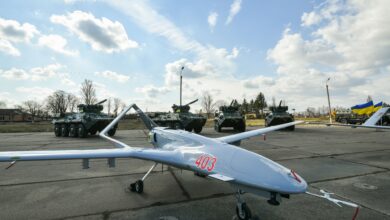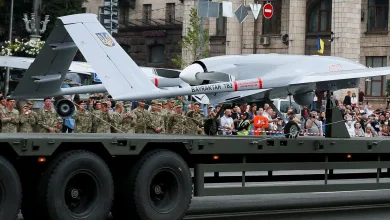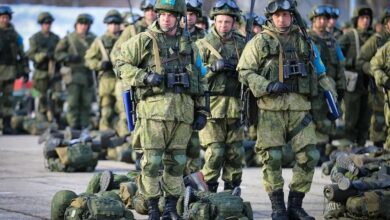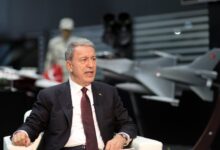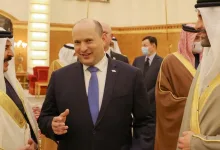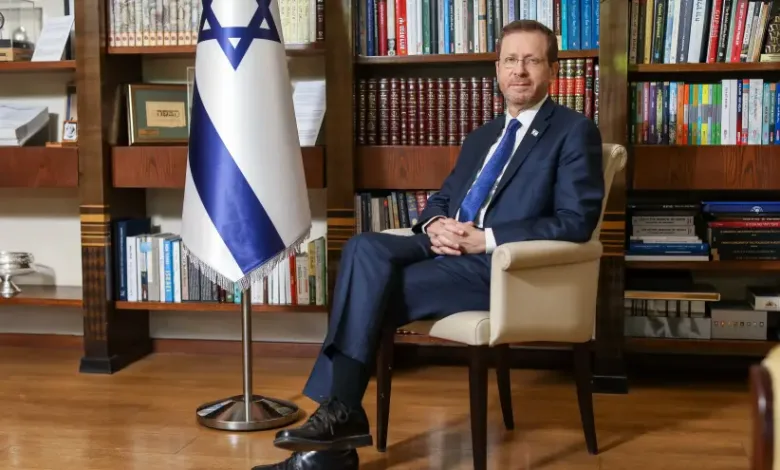
“Hidden light” – that is one of the main discoveries Isaac Herzog says he has made over the last 10 months.
It is how he refers to a secret power within Israeli society that he has come to know intimately now, as the 11th president of the State of Israel – hundreds and thousands of people who work to empower the weak, lift up the poor and strengthen this nation’s resilience.
“Take today as an example,” he said during a recent interview with The Jerusalem Post, his first since taking office. He goes on to tell the story of a man he met that morning, who wakes up every day at 3 a.m. to organize Shabbat meals for those in need.
“You ask yourself, where does this come from? and you realize that there are so many people like this who are just doing good,” he said.
“Israeli society is diverse and I know all its different sides,” he continued. “What has been reinforced in me is the recognition that, while it might be hidden, people really want to get to know one other and live a normal life.”
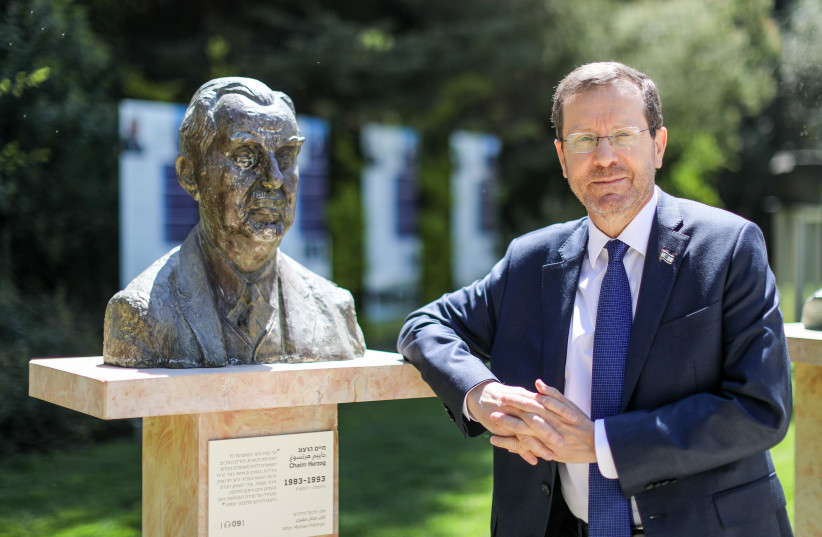
Herzog knows Israel well. Before becoming president, he served as chairman of the Jewish Agency, as chairman of the Labor Party, head of the Opposition, welfare minister and more. But in this job, he explained, he gets “the entire picture in a much more holistic way.”
Most of the time, he said, we, in Israel, hear the cacophony of extreme voices. “We don’t hear the silent majority, which wants to live nicely alongside one another,” he said. “There are wonderful and incredible people, who amaze me and give of their lives just to do good for people, with disregard to their religion or belief.”
A few weeks ago, Herzog said, he participated in a video conversation with Eytan Stibbe, the Israeli businessman who bought a ticket to space and spent more than two weeks on the International Space Station.
“I was talking to Eytan Stibbe and thought to myself, look at his family: His mother, Ora, was an olah from Brazil, his children have served in top IDF units,” Herzog said. He then looked around the room and saw the children who were also there – Jewish, Druze and Muslim “space geeks,” as he called them – who all dream of one day reaching space.
“This I did not see before,” he said. “This system of life is why Israelis are so happy, despite the challenges that we face living here. I am in awe of our nation.”
It was an interesting thought to hear from Herzog just ahead of Israel’s Independence Day, when the country yet again feels like it is on the brink of political instability. Terrorism is once again hitting Israel’s streets, but Herzog makes a point of focusing on the positive, on what we have to be optimistic about, though he does admit to concern about Iran, and on another level, he worries that the Diaspora is too judgmental of Israel.
WHEN HERZOG was elected president last June, it was almost a natural path for the 61-year-old politician. His father, Chaim Herzog, was Israel’s sixth president, from 1983 to 1993. His grandfather and namesake was the Ashkenazi chief rabbi of Israel, upon its establishment in 1948.
His uncle, Abba Eban, a former foreign minister and one of the country’s most respected diplomats, was married to Suzy Ambache, Herzog’s mother’s sister, who was the founding president of the Israel Cancer Association. Another uncle was Yaakov, his father’s younger brother, who was director general of the Prime Minister’s Office under Levi Eshkol and who also served as Israel’s ambassador to Canada, where he engaged in a famous debate with historian Arnold Toynbee. President Herzog’s older brother, Mike, is currently Israel’s ambassador to the US.
If ever there was an Israeli family that drew similarities to the Kennedys, it’s the Herzogs. Some might see greater similarity between the Herzogs and the Bush family, considering that father and son were both presidents of the US and other family members have held leading positions in local politics.
Herzog does not shy away from his lineage. He embraces it and has found that it can serve as a diplomatic asset, particularly in the Middle East, where other leaders – like King Abdullah of Jordan and Mohammed bin Zayed al Nahyan of the United Arab Emirates – followed in the footsteps of their fathers.
When it comes to royals, it’s almost a given that the eldest son or daughter will inherit the crown. In the case of Israeli presidents, it doesn’t work that way, because second generation presidents have to work hard to get elected. They don’t inherit their roles, regardless of how much influence their fathers may wield.
While Herzog had to be elected to his role, his lineage is still respected, and his extended pedigree is impressive, taking into account both sides of his immediate family and both sets of grandparents.
In his spacious, book-lined office at the President’s Residence, there are photos of his father, grandfather and others (like Rabbi Abraham Isaac Kook, widely considered one of the fathers of religious Zionism), and an autographed photo of Chaim Weizmann, Israel’s first president, which he gave to Abba Eban, whose son Eli, a noted clarinetist who lives in America, gave to the 11th president.
HERZOG DOESN’T pretend that everything in Israel is perfect. When we met with him, Prime Minister Naftali Bennett’s political future hung in the balance. Yamina MK Idit Silman had bolted the coalition and the prospect of a new election was looming on the horizon.
“I am concerned with the political situation, since the political situation reflects a lack of stability that is dangerous in general for the functioning of a healthy state and we need a healthy state to confront the different challenges we face,” Herzog said.
Nevertheless, he will not be getting involved, despite calls from some political pundits for him to invite party leaders to a meeting and try to mediate through the storm.
“I have not hidden my opinion, from my first day in office, that political stability is critical and important for the State of Israel, and that anyone who makes important political decisions should keep this in mind,” he said.
While he might not mediate formally, Herzog meets regularly with members of Knesset from across the spectrum and, as reflected in the presidential race last year when Herzog won 87 votes, he is widely regarded by politicians on the Left and the Right.
“Everyone comes here and with everyone I have terrific relations,” he said, naming Prime Minister Naftali Bennett, Foreign Minister Yair Lapid and opposition leader Benjamin Netanyahu.
These close ties show how Herzog has functioned as president. He is not just a ceremonial figurehead but – in coordination with Bennett and Lapid – is one of the architects of Israeli foreign policy today and a natural diplomat.
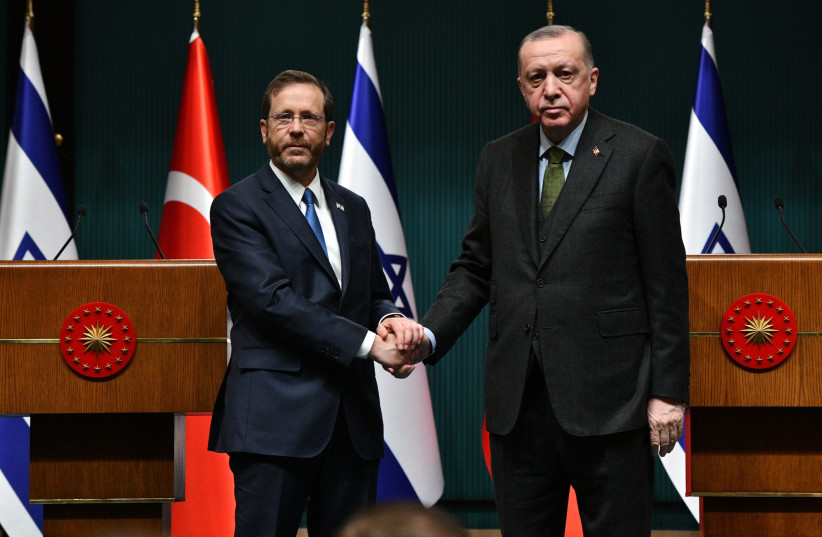
When Israel and Turkey renewed diplomatic ties in March, it was Herzog who made the trip to Ankara and met with President Recep Tayyip Erdogan. In January, he was in Abu Dhabi for a summit with MBZ; in March he was in Jordan for talks with Abdullah and in Paris for talks with Emmanuel Macron,;in November he was in London for talks with Prime Minister Boris Johnson, and he has also paid visits to Ukraine, Greece, Cyprus and more.
Herzog said that he hopes these visits – especially to Arab countries – send ripples throughout the region and show people what is possible when peace is achieved.
“When I stood in Turkey next to the president or in Abu Dhabi next to the crown prince or in Jordan next to the king with Israeli flags waving, then maybe there is a 10-year-old somewhere in the Muslim world who sees this and thinks that the Israelis are not so bad,” he explains.
THERE IS no doubt that one of the more significant trips Herzog has made was to Ankara, where he became the highest-level Israeli to visit the country since one of his predecessors – Shimon Peres – visited in 2007. In the 15 years since, Israeli-Turkish relations have gone from best of friends to near enemies, with Erdogan turning into one of the most vile antisemitic leaders currently on the world stage.
That has begun to change. Herzog inspected an honor guard at the Presidential Palace alongside Erdogan, as Israeli flags fluttered nearby and “Hatikvah” rang across the long courtyard. The president says that he entered into this process with Turkey with his eyes wide open and without ignoring the past. The rapprochement was not out of love, he said clearly, but due to a window of opportunity created by mutual diplomatic interests.
“We spoke about what happened and I certainly went into the process without illusions, saying that this is the beginning of a process and it will be evaluated based upon action,” Herzog explained. “It is like developing a relationship. I do not know what will happen, but I know that there is a genuine Turkish effort to improve relations with Israel and I am giving it a chance.”
Mentioning what he described as Erdogan’s unequivocal condemnation of the latest terrorist attacks against Israel in a pre-Ramadan phone call, the president believes that it was a positive sign and that Israel planned to proceed with caution, with the aim of continuing to improve ties, while not forgetting its prior allegiances with countries like Greece and Cyprus.
Herzog’s visit to Jordan was also extremely significant. While it wasn’t their first meeting (as head of the opposition, Herzog visited Jordan and met the king a number of times), it was the first time that the monarch held such a meeting above board, with an honor guard, Israeli flags and in public.
Their conversation focused on a wide-range of issues – from the region to energy, the establishment of a possible joint food bank and other ideas that are for the benefit of humanity.
One leader he does not plan on meeting anytime soon is Palestinian Authority President Mahmoud Abbas, although they have exchanged greetings.
“I have contacts with some Palestinians, with permission of course, and everything needs to be in its right time,” he said when we asked about a meeting with Abbas. “I have spoken to him before previous holidays and I hope to speak to him again at the end of Ramadan.”
And when it comes to the recent wave of terrorist attacks, Herzog is confident that Israeli security forces will prevail. “The defense establishment has always known in the end how to identify the sources, to diagnose and to develop the tools needed to stop the terror, and they will do that once again,” he said confidently.
In addition to the tragic loss of human life, he is also deeply disturbed by the attacks and vandalism at Joseph’s Tomb in Nablus. “I tell all our friends around the world who love to criticize us and tell us to implement the Oslo [Accords] vision, that part of Oslo was protecting the right for Jews to worship in holy places, and the first thing that happens is the destruction of Joseph’s Tomb,” Herzog explained.
“I say to the Palestinians: You cannot hold the stick from both of its ends and expect that Israel will take risks for there to be a diplomatic process,” he continued. “It will be very hard to embark on a diplomatic process when there is no understanding that this is not done.”
WHERE HERZOG also stands out in comparison to his predecessors is the involvement of his wife, Michal, in presidential duties and events. If you see Herzog at an event, Michal is usually right there beside him. It is refreshing, new and part of the president’s strategy to make the President’s Residence the “house of the people,” as he calls it.
A lawyer by profession, she has served as the director of a philanthropic organization for the past 15 years, hosts events at the residence, is a frequent speaker at gatherings and sits alongside her husband at most of the events taking place at the President’s Residence, while also accompanying him on state visits and tours around the country.
She also popped into his office briefly during our interview. When asked again about her role, she replied that even though it was her husband who was appointed, she decided to give up her job and work at his side.
The president, who is very proud of his wife and often mentions her in conversation, regards her presence as a contribution to his presidency.
“We understand that we’re a team,” she said, and indeed they are. During their mandatory army service, both Isaac and Michal served in Unit 8200. Later, they studied law at Tel Aviv University and have generally since been side by side.
Both come from families that strongly believe in public service. Each of their fathers served abroad: his as an ambassador to the UN, hers as a military attache in Brazil and Canada. Both also speak Arabic – though President Herzog is more proficient – and during visits to Arab countries and Arab communities in Israel he spoke in both Hebrew and Arabic, even to the point of quoting from Muslim scriptures.
On the day we met the president, Herzog was going to an iftar event in Nazareth, hosted by the Northern District Bar Association, which has a large number of Arab members. His wife was going to an Arab village near Nazareth to attend an iftar dinner for women.
Herzog has over six years left to his term, and when asked whether he would follow the example of Israel’s fifth president, Yitzhak Navon, and return to politics after concluding his term, he vehemently dismissed any hint that he would consider running again for political office.
“Are you worried about my welfare?” he quipped.
“It is amazing that you are even asking me,” Herzog added. “I am very happy with what I do today. I have a sense of mission and a sense of being. I have also already said that I am not interested in returning to active politics.”
That sense of mission shows. Israel’s president is active, runs a busy schedule and is playing a key role in the diplomatic efforts of the current Israeli government. It is a win-win for both the president and the nation.


